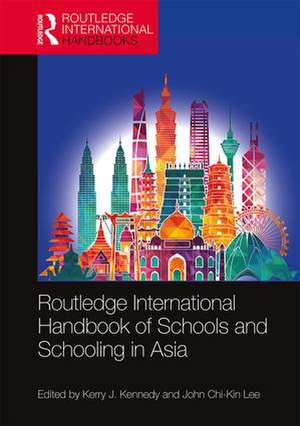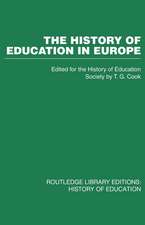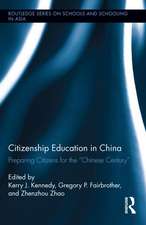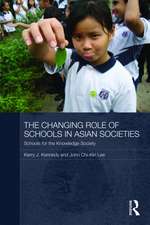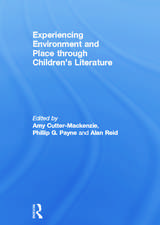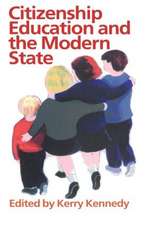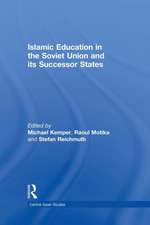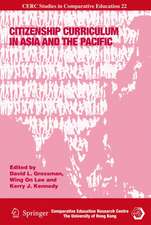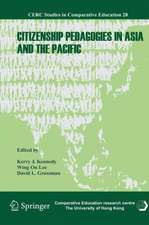Routledge International Handbook of Schools and Schooling in Asia: Routledge International Handbooks
Editat de Kerry J. Kennedy, John Chi-Kin Leeen Limba Engleză Hardback – 3 mai 2018
The Routledge International Handbook of Schools and Schooling in Asia
brings together experts in each area to contribute their knowledge, providing a multidimensional and rich view of the issues confronting the region’s school and education systems.
Chapters 34, 35, 36, 37, and 38 of this book are freely available as downloadable Open Access PDFs at http://www.taylorfrancis.com under a Creative Commons Attribution-Non Commercial-No Derivatives (CC-BY-NC-ND) 4.0 license.
Din seria Routledge International Handbooks
-
 Preț: 371.78 lei
Preț: 371.78 lei -
 Preț: 375.50 lei
Preț: 375.50 lei -
 Preț: 362.19 lei
Preț: 362.19 lei -
 Preț: 352.08 lei
Preț: 352.08 lei - 9%
 Preț: 1487.70 lei
Preț: 1487.70 lei - 5%
 Preț: 317.31 lei
Preț: 317.31 lei -
 Preț: 372.05 lei
Preț: 372.05 lei -
 Preț: 361.19 lei
Preț: 361.19 lei -
 Preț: 390.13 lei
Preț: 390.13 lei -
 Preț: 311.91 lei
Preț: 311.91 lei - 9%
 Preț: 1488.67 lei
Preț: 1488.67 lei -
 Preț: 390.22 lei
Preț: 390.22 lei -
 Preț: 347.74 lei
Preț: 347.74 lei -
 Preț: 347.74 lei
Preț: 347.74 lei - 9%
 Preț: 1490.11 lei
Preț: 1490.11 lei -
 Preț: 356.22 lei
Preț: 356.22 lei -
 Preț: 348.27 lei
Preț: 348.27 lei - 5%
 Preț: 328.11 lei
Preț: 328.11 lei -
 Preț: 394.24 lei
Preț: 394.24 lei - 8%
 Preț: 392.89 lei
Preț: 392.89 lei - 8%
 Preț: 422.42 lei
Preț: 422.42 lei -
 Preț: 357.22 lei
Preț: 357.22 lei - 8%
 Preț: 421.97 lei
Preț: 421.97 lei - 5%
 Preț: 452.16 lei
Preț: 452.16 lei -
 Preț: 341.55 lei
Preț: 341.55 lei - 9%
 Preț: 1651.61 lei
Preț: 1651.61 lei - 9%
 Preț: 1665.70 lei
Preț: 1665.70 lei -
 Preț: 381.91 lei
Preț: 381.91 lei -
 Preț: 350.20 lei
Preț: 350.20 lei -
 Preț: 347.74 lei
Preț: 347.74 lei - 20%
 Preț: 1401.00 lei
Preț: 1401.00 lei -
 Preț: 342.76 lei
Preț: 342.76 lei -
 Preț: 345.63 lei
Preț: 345.63 lei -
 Preț: 345.16 lei
Preț: 345.16 lei -
 Preț: 353.88 lei
Preț: 353.88 lei -
 Preț: 1057.72 lei
Preț: 1057.72 lei -
 Preț: 348.05 lei
Preț: 348.05 lei - 5%
 Preț: 337.33 lei
Preț: 337.33 lei -
 Preț: 365.90 lei
Preț: 365.90 lei - 9%
 Preț: 1528.86 lei
Preț: 1528.86 lei -
 Preț: 346.77 lei
Preț: 346.77 lei -
 Preț: 392.48 lei
Preț: 392.48 lei - 9%
 Preț: 1454.51 lei
Preț: 1454.51 lei - 5%
 Preț: 326.85 lei
Preț: 326.85 lei -
 Preț: 346.11 lei
Preț: 346.11 lei -
 Preț: 361.74 lei
Preț: 361.74 lei - 9%
 Preț: 1349.74 lei
Preț: 1349.74 lei - 19%
 Preț: 422.81 lei
Preț: 422.81 lei - 8%
 Preț: 385.56 lei
Preț: 385.56 lei
Preț: 1209.56 lei
Preț vechi: 1630.29 lei
-26% Nou
Puncte Express: 1814
Preț estimativ în valută:
231.44€ • 242.30$ • 191.51£
231.44€ • 242.30$ • 191.51£
Carte tipărită la comandă
Livrare economică 05-19 aprilie
Preluare comenzi: 021 569.72.76
Specificații
ISBN-13: 9781138908499
ISBN-10: 1138908495
Pagini: 1084
Ilustrații: 50
Dimensiuni: 174 x 246 x 66 mm
Greutate: 0.45 kg
Ediția:1
Editura: Taylor & Francis
Colecția Routledge
Seria Routledge International Handbooks
Locul publicării:Oxford, United Kingdom
ISBN-10: 1138908495
Pagini: 1084
Ilustrații: 50
Dimensiuni: 174 x 246 x 66 mm
Greutate: 0.45 kg
Ediția:1
Editura: Taylor & Francis
Colecția Routledge
Seria Routledge International Handbooks
Locul publicării:Oxford, United Kingdom
Public țintă
PostgraduateCuprins
List of figures and tables
Contributors
List of abbreviations
1. Schools and Schooling in Asia: Achievements and Challenges for ‘Asia Rising’: an introduction to the handbook (Kerry J. Kennedy and John Chi-Kin Lee)
Section 1: Framing 21st-Century Education in Asia
2. Closing the Gaps: What does an equity agenda look like in Asia-Pacific? (Gwang-Jo Kim and Wesley Teter)
3. Notions of equality and fairness in education: The case of meritocracy in Singapore (Jason Tan)
4. “Inter-referencing” as methodology: The “emotional contagion” of PISA and the discursive formation of an emergent East Asia policy field (Aaron Koh)
5. Looking in from outside: Schools and schooling in Asia from an outside perspective (Christine Halse)
Section 2: Curriculum
6. Introduction: Reorienting curriculum practices in changing Asian societies (Edmund Hau-fai Law)
7. High school mathematics curriculum in East Asia: Design and trends (Wai Hong Chan and Siwan Sum)
8. Intended curriculum of nature of science for prospective school science teachers: Scientism in Chinese science teacher educators’ conceptions (Zhi Hong Wan)
9. K-12 service-based learning in three Chinese societies (Huixuan Xu)
10. Issues of educational equity, curriculum and pedagogy in Hong Kong (Benjamin "Benji" Chang)
11. Re-engineering the curricular and pedagogical practices in the Asian region (Edmond Hau-fai Law)
Section 3: Learning
12. Learning and pedagogy: Asian perspectives (Ronnel B. King)
13. Learning primary science by inquiry: What does a technology-enabled curriculum look like? (Daner Sun and Chee-Kit Looi)
14. Preparation for future collaboration: An interdisciplinary learning design in a Singaporean primary school (Rachel Lam, Michelle Low, and Jenyi-Li)
15. Designing new media for new Literacy in an arts classroom: A lesson about designed affordance and perceived affordance (Mingfong Jan)
16. An Investigation of interest-driven learning environment for low progress learners: Case studies in Singapore (Longkai Wu, Sujin He, Wei Zhang)
17. The internal/external frame of reference model of academic self-concept formation: Extension to a foreign language and Chinese vocational students (Lan Yand)
Section 4: Assessment
18. Technology-Enhanced Assessment Reforms in Asia (Magdalena Mo Ching Mok)
19. The changing measurement paradigms for the changing education in China (Xiaoting Huang)
20. An assessment of learning Cantonese opera movement in Hong Kong: Application of the computerised kinetic chain assessment and learning system (Bo-Wah Leung, Magdalena Mo Ching Mok, Bor-Chen Kuo, Zhi-Yong Liu, Sze Ming Lam, Chun Wai Ng, Lee Cheng, Kevin Hang Hey Ma and Tsz Wing Choi)
21. Assessing the cognitive components of reading in Thai (Exkarach Deenang, Bor-Chen Kuo and Chen-Huei Liao)
22. Computerised adaptive testing: Application and implications for teaching and learning in Indonesia (Muslem Duad, Bor-Chen Kuo, Yusrizal and Magdalena Mo Ching Mok)
Section 5: International Schools
23. International schools and schooling in Asia (Darren A. Bryant)
24. And a green tea Frappuccino: Developing the local dimension of international schools (Ed Wickins and Arnett Edwards)
25. Asian or international? Exploring the tensions and opportunities offered by international schools in Asia for local students (Lucy Bailey)
26. Do international school staff receive professional development training about third culture kids (TCKS)?Perspectives from faculty and parents (Yvonne McNulty and Margaret Carter)
27. Leadership in Asian international schools: Mapping a research agenda (Darren A. Bryant)
28. The IB Research Programme - Instrumental and enlightenment use of research findings in Asia (Bradley Shrimpton and Eloisa Ramos)
Section 6: Private Supplementary Tutoring
29. Private tutoring in Asia: Illuminating the shadow (Maria Manzon)
30. Shadow education in East Asia: Entrenched but evolving private supplementary tutoring (Wei Zhang and Yoko Yamato)
31. Private tutoring in Southeast Asia: Knowledge economies, positional goods and double entendres (William C. Brehm)
32. Shadow schooling in South Asia: Contexts, forms and characteristics of private supplementary tutoring in English at the secondary level in rural Bangladesh (Rafsan Mahmud)
33. (Un)regulating shadow education in West Asia: Armenia, Azerbaijan, Georgia and Turkey (Magda Nutsa Kobakhidze)
Section 7: Information and Communications Technology
34. Introduction: Digital learning for development of Asian Schools (Cher Ping Lim)
35.Digital learning for developing Asian countries: Achieving Equity, quality and efficiency in education (Cher Ping Lim, Victoria Tinio, Matthew Smith Miron Kumar Bhowmik)
36. Current status, challenges and opportunities of Intelligent Tutoring System (ITS) in Developing Countries in Asia (Kaushal Kumar Bhagat, Ma. Mercedes T. Rodrigo, and Chun-Yen Chang)
37. A systematic literature review of game-based learning and gamification research in Asia: The synthesized findings and research gap (Hyo-Jeong So and Minhwi Seo)
38. Learning analytics: Approaches and cases from Asia (Bodong Chen, Chen Chi-Ming Chen ,Huang-Yao Hong , Ching Sing Chai)
Section 8: Early Childhood Education
39. Early years education: Movements in the field (Liz Jones)
40. Masks, masquerades and ironic performances: getting our(selves) heard (Yuen Wai Kwan, Gail)
41. Neither a borrower nor a lender be? Better to Question How to Borrow. An Exploration of Asia as Method in Teaching Drama-in-Education in Hong Kong (Po Chi Tam)
42. The challenge of promoting creativity in Hong Kong early childhood context (Cheung, Hun Ping Rebecca)
43. Telling tales: parental reactions to children’s picture books (Richard Wong Kwok Shing)
Section 9: Language Education
44. Tensions of language education in Asia (Bob Adamson)
45. Trilingualism and languages policy in education in Sri Lanka (Indika Liyanage)
46. Chinese as second language education in Asian schools (Danping Wang)
47. Language teacher professional development in Asia: Historical trends, current practices and future directions (Laura Gurney, Indika Liyanage and Lanxi Huang)
48. Implementation and impact of language-in-education policies: Insights from South Korea and Hong Kong (Tae Hee Choi)
Section 10: Special Education
49. Introduction: Leading the way in supporting children with additional needs (Ivan Ka Chun Cheung, Elena Sze Chi Kwong, and Kevin Kien Hoa Chung)
50. Understanding and supporting children with dyslexia and late-emerging reading difficulties (Kevin Kien Hoa Chung)
51. Neural basis of learning issues in children with autism: A bridge to remediation planning (Yvonne Ming-Yee Han and Agnes Sui-Yin Chan)
52. Gaps and go in policy, practice and research of gifted education in China, Hong Kong, Singapore, and Taiwan (Anna Na Na Hui, Mavis Wu Jing He, Ching-Chih Kuo, Ai Girl Tan, Yifan Lyu and Lai Kwan Chan)
53. Writing Difficulties in Mainland China, Taiwan, Hong Kong and Japan: An Overview of the Issues (Patcy Pui-Sze Yeung)
Section 11: Moral and Civic Education
54. Introudction:Civic and Moral Education (Zhenzhou Zhao)
55. Introduction: The dynamics of moral development: Rethinking what develops and how? (Minkang Kim)
56. Global citizenship education in Asia (Theresa Alviar-Martin and Mark C. Baildon)
57. Human rights education in Asia (Eric King-man Chong)
58. Citizenship education from a multicultural perspective: The case of Malaysia (Vishalache Balakrishnan)
59. Alienated and disaffected students: The civic capacity of ‘outsiders’ in Asian societies (Xiaoxue Kuang)
Section 12: Vocational Education
60. TVET as an increasingly important part of schooling in Asia (Margarita Pavlova)
61. Development of TVET systems in the ASEAN region – Issues of quality and standards (Thomas Schröder)
62. Career Guidance in TVET: challenges of implementation (Rong Kang and Margarita Pavlova)
63. A framework for success: A regional overview of the ICT-enhanced practices in TVET (Margarita Pavlova)
Section 13: Education for Sustainable Development
64. Sustainable schooling in the Asia-Pacific region: An imperative of hope (Tamara Savelyeva)
65. Nature schools and China’s environmental education (Rob EFIRD)
66. The uneven work of sustainability: Schooling, tourism and rural development in Southwest China (Jinting WU)
67. Decolonizing pedagogy for inclusive education: Tagorean Analysis of a Case Study (Mousumi Mukherjee)
68. Building active minds among the local youth for rural sustainability - New role of local schools in an aging and shrinking society (Shogo KUDO, Ryu YANAGISAWA)
69. Stepping up the challenge: Fostering sustainability consciousness of Hong Kong students with New Senior Secondary Liberal Studies curriculum (Tamara SAVELYEVA)
Section 14: Gender
70. Gender and Schooling in Asia (Anita K.W. Chan)
71. Gender, ethnicity and schooling in China (Yang Miaoyan)
72. Gender-related implications of the reform of school leadership in Indonesia (Jill Sperandio)
73. Gender equity education in Taiwan: History, practices and challenges (Li-Ching Wang)
74. To lead and to mother: Contradictory constructions of new femininities in an elite girls’ school in Hong Kong (Dorothy W. H. Lee and Anita K. W. Chan)
Section 15: Ethnic Minorities
75. Seeking Equity in Education for Asia’s Ethnic minorities (Ming-tak Hue)
76. Education for ethnic minority young people in Hong Kong: What school factors make them unsuccessful? (Miron Kumar Bhowmik and Ming-tak Hue)
77. Promoting cultural responsiveness and multicultural competency in Hong Kong schools (Ming-tak Hue)
78. School roles in ethnic minority education in Korea (Yang-Hee Kim)
79. The changing policy discourse and the implementation of multicultural education in Taiwan in the 21st century – education for new immigrant children and beyond (Chen, I-ru, Dorothy)
Section 16: Sexual Minorities
80. Contesting sexual and transgender prejudice: Advocating human rights of LGBTQ students (Diana Kan Kwok)
81. Sexual prejudice and school experience of LGBQ students in South Korea and Hong Kong (Diana Kan Kwok, Jieha Lee)
82. From Bakla to Transpinay: Transgender students in Philippine schools (Brenda R. Alegre)
83. Contesting school heterosexism rights-based sexuality education for LGBQ students (Diana Kan Kwok, Barry M. W. Lee)
84. Community support services to LGBQ students in Mainland China, Hong Kong and Taiwan (Kim Kwok, Diana Kan Kwok)
85. Supporting transgender students: Chinese school social workers as transgender allies (Diana Kan Kwok)
Section 17: Teacher Education
86. Facilitating student-teacher professional learning in their field experience (May May Hung Cheng)
87. Changes in the teaching motivations of student teachers in Hong Kong (Angel K. Y. Wong, May M. H. Cheng, & Sylvia Y. F. Tang)
88. The teaching practicum in Singapore: Developing teacher identity and professional practices (Bee Leng Chua, Yew-Jin Lee, & Woon Chia Liu)
89. Engaging Student Teachers in Video-Mediated Self-Reflection in Teaching Practica (Handoyo Puji Widodo and Sandi Ferdiansyah)
90. Challenges for student-teachers during their teaching practicum in an early childhood teacher education context (Cheng, M. M. H., Tang, S. Y. F., & Wong, A. K. Y.)
Section 18: Learning Study
91. Lesson and learning Study – Originated in the east and spreading worldwide (Ko Po Yuk)
92. Lesson study as an effective element for curriculum implementation and innovation (Hiroyuki Kuno)
93. The growth of lesson study globally and in Singapore: Implications for quality and sustainability (Christine Kim-Eng Lee & Christina Lim-Ratnam)
94. The development of Learning Study in Hong Kong and its shifting focus in university-school partnership (Ko Po Yuk)
95. Lesson study in Brunei Darussalam: Changing the paradigm for teaching and learning (K. Wood, J.H. Jaidin, R. Jawawi, J.S.H.Q. Perera, S. Salleh, M. Shahrill, S. Sithamparam)
Section 19: School Leadership
96. School leadership in Asia – A growing knowledge base (Allan Walker)
97. Developments in educational leadership research and practice in Asia (Darren A. Bryant and Allan Walker)
98. “We need an iron hand, but the iron hand must be a clean hand”: Contextualizing the practice of school leadership in Vietnam (Philip Hallinger, Truong Dinh Thang and Gian Tu Trung)
99. School principalship in China: A collective portrait (Qian Haiyan)
100. Creativity and leadership as organizational vectors: Implications for East Asian school reform (Roger Shouse, Jinyan Bai, and Chenwei Ma)
Index
Contributors
List of abbreviations
1. Schools and Schooling in Asia: Achievements and Challenges for ‘Asia Rising’: an introduction to the handbook (Kerry J. Kennedy and John Chi-Kin Lee)
Section 1: Framing 21st-Century Education in Asia
2. Closing the Gaps: What does an equity agenda look like in Asia-Pacific? (Gwang-Jo Kim and Wesley Teter)
3. Notions of equality and fairness in education: The case of meritocracy in Singapore (Jason Tan)
4. “Inter-referencing” as methodology: The “emotional contagion” of PISA and the discursive formation of an emergent East Asia policy field (Aaron Koh)
5. Looking in from outside: Schools and schooling in Asia from an outside perspective (Christine Halse)
Section 2: Curriculum
6. Introduction: Reorienting curriculum practices in changing Asian societies (Edmund Hau-fai Law)
7. High school mathematics curriculum in East Asia: Design and trends (Wai Hong Chan and Siwan Sum)
8. Intended curriculum of nature of science for prospective school science teachers: Scientism in Chinese science teacher educators’ conceptions (Zhi Hong Wan)
9. K-12 service-based learning in three Chinese societies (Huixuan Xu)
10. Issues of educational equity, curriculum and pedagogy in Hong Kong (Benjamin "Benji" Chang)
11. Re-engineering the curricular and pedagogical practices in the Asian region (Edmond Hau-fai Law)
Section 3: Learning
12. Learning and pedagogy: Asian perspectives (Ronnel B. King)
13. Learning primary science by inquiry: What does a technology-enabled curriculum look like? (Daner Sun and Chee-Kit Looi)
14. Preparation for future collaboration: An interdisciplinary learning design in a Singaporean primary school (Rachel Lam, Michelle Low, and Jenyi-Li)
15. Designing new media for new Literacy in an arts classroom: A lesson about designed affordance and perceived affordance (Mingfong Jan)
16. An Investigation of interest-driven learning environment for low progress learners: Case studies in Singapore (Longkai Wu, Sujin He, Wei Zhang)
17. The internal/external frame of reference model of academic self-concept formation: Extension to a foreign language and Chinese vocational students (Lan Yand)
Section 4: Assessment
18. Technology-Enhanced Assessment Reforms in Asia (Magdalena Mo Ching Mok)
19. The changing measurement paradigms for the changing education in China (Xiaoting Huang)
20. An assessment of learning Cantonese opera movement in Hong Kong: Application of the computerised kinetic chain assessment and learning system (Bo-Wah Leung, Magdalena Mo Ching Mok, Bor-Chen Kuo, Zhi-Yong Liu, Sze Ming Lam, Chun Wai Ng, Lee Cheng, Kevin Hang Hey Ma and Tsz Wing Choi)
21. Assessing the cognitive components of reading in Thai (Exkarach Deenang, Bor-Chen Kuo and Chen-Huei Liao)
22. Computerised adaptive testing: Application and implications for teaching and learning in Indonesia (Muslem Duad, Bor-Chen Kuo, Yusrizal and Magdalena Mo Ching Mok)
Section 5: International Schools
23. International schools and schooling in Asia (Darren A. Bryant)
24. And a green tea Frappuccino: Developing the local dimension of international schools (Ed Wickins and Arnett Edwards)
25. Asian or international? Exploring the tensions and opportunities offered by international schools in Asia for local students (Lucy Bailey)
26. Do international school staff receive professional development training about third culture kids (TCKS)?Perspectives from faculty and parents (Yvonne McNulty and Margaret Carter)
27. Leadership in Asian international schools: Mapping a research agenda (Darren A. Bryant)
28. The IB Research Programme - Instrumental and enlightenment use of research findings in Asia (Bradley Shrimpton and Eloisa Ramos)
Section 6: Private Supplementary Tutoring
29. Private tutoring in Asia: Illuminating the shadow (Maria Manzon)
30. Shadow education in East Asia: Entrenched but evolving private supplementary tutoring (Wei Zhang and Yoko Yamato)
31. Private tutoring in Southeast Asia: Knowledge economies, positional goods and double entendres (William C. Brehm)
32. Shadow schooling in South Asia: Contexts, forms and characteristics of private supplementary tutoring in English at the secondary level in rural Bangladesh (Rafsan Mahmud)
33. (Un)regulating shadow education in West Asia: Armenia, Azerbaijan, Georgia and Turkey (Magda Nutsa Kobakhidze)
Section 7: Information and Communications Technology
34. Introduction: Digital learning for development of Asian Schools (Cher Ping Lim)
35.Digital learning for developing Asian countries: Achieving Equity, quality and efficiency in education (Cher Ping Lim, Victoria Tinio, Matthew Smith Miron Kumar Bhowmik)
36. Current status, challenges and opportunities of Intelligent Tutoring System (ITS) in Developing Countries in Asia (Kaushal Kumar Bhagat, Ma. Mercedes T. Rodrigo, and Chun-Yen Chang)
37. A systematic literature review of game-based learning and gamification research in Asia: The synthesized findings and research gap (Hyo-Jeong So and Minhwi Seo)
38. Learning analytics: Approaches and cases from Asia (Bodong Chen, Chen Chi-Ming Chen ,Huang-Yao Hong , Ching Sing Chai)
Section 8: Early Childhood Education
39. Early years education: Movements in the field (Liz Jones)
40. Masks, masquerades and ironic performances: getting our(selves) heard (Yuen Wai Kwan, Gail)
41. Neither a borrower nor a lender be? Better to Question How to Borrow. An Exploration of Asia as Method in Teaching Drama-in-Education in Hong Kong (Po Chi Tam)
42. The challenge of promoting creativity in Hong Kong early childhood context (Cheung, Hun Ping Rebecca)
43. Telling tales: parental reactions to children’s picture books (Richard Wong Kwok Shing)
Section 9: Language Education
44. Tensions of language education in Asia (Bob Adamson)
45. Trilingualism and languages policy in education in Sri Lanka (Indika Liyanage)
46. Chinese as second language education in Asian schools (Danping Wang)
47. Language teacher professional development in Asia: Historical trends, current practices and future directions (Laura Gurney, Indika Liyanage and Lanxi Huang)
48. Implementation and impact of language-in-education policies: Insights from South Korea and Hong Kong (Tae Hee Choi)
Section 10: Special Education
49. Introduction: Leading the way in supporting children with additional needs (Ivan Ka Chun Cheung, Elena Sze Chi Kwong, and Kevin Kien Hoa Chung)
50. Understanding and supporting children with dyslexia and late-emerging reading difficulties (Kevin Kien Hoa Chung)
51. Neural basis of learning issues in children with autism: A bridge to remediation planning (Yvonne Ming-Yee Han and Agnes Sui-Yin Chan)
52. Gaps and go in policy, practice and research of gifted education in China, Hong Kong, Singapore, and Taiwan (Anna Na Na Hui, Mavis Wu Jing He, Ching-Chih Kuo, Ai Girl Tan, Yifan Lyu and Lai Kwan Chan)
53. Writing Difficulties in Mainland China, Taiwan, Hong Kong and Japan: An Overview of the Issues (Patcy Pui-Sze Yeung)
Section 11: Moral and Civic Education
54. Introudction:Civic and Moral Education (Zhenzhou Zhao)
55. Introduction: The dynamics of moral development: Rethinking what develops and how? (Minkang Kim)
56. Global citizenship education in Asia (Theresa Alviar-Martin and Mark C. Baildon)
57. Human rights education in Asia (Eric King-man Chong)
58. Citizenship education from a multicultural perspective: The case of Malaysia (Vishalache Balakrishnan)
59. Alienated and disaffected students: The civic capacity of ‘outsiders’ in Asian societies (Xiaoxue Kuang)
Section 12: Vocational Education
60. TVET as an increasingly important part of schooling in Asia (Margarita Pavlova)
61. Development of TVET systems in the ASEAN region – Issues of quality and standards (Thomas Schröder)
62. Career Guidance in TVET: challenges of implementation (Rong Kang and Margarita Pavlova)
63. A framework for success: A regional overview of the ICT-enhanced practices in TVET (Margarita Pavlova)
Section 13: Education for Sustainable Development
64. Sustainable schooling in the Asia-Pacific region: An imperative of hope (Tamara Savelyeva)
65. Nature schools and China’s environmental education (Rob EFIRD)
66. The uneven work of sustainability: Schooling, tourism and rural development in Southwest China (Jinting WU)
67. Decolonizing pedagogy for inclusive education: Tagorean Analysis of a Case Study (Mousumi Mukherjee)
68. Building active minds among the local youth for rural sustainability - New role of local schools in an aging and shrinking society (Shogo KUDO, Ryu YANAGISAWA)
69. Stepping up the challenge: Fostering sustainability consciousness of Hong Kong students with New Senior Secondary Liberal Studies curriculum (Tamara SAVELYEVA)
Section 14: Gender
70. Gender and Schooling in Asia (Anita K.W. Chan)
71. Gender, ethnicity and schooling in China (Yang Miaoyan)
72. Gender-related implications of the reform of school leadership in Indonesia (Jill Sperandio)
73. Gender equity education in Taiwan: History, practices and challenges (Li-Ching Wang)
74. To lead and to mother: Contradictory constructions of new femininities in an elite girls’ school in Hong Kong (Dorothy W. H. Lee and Anita K. W. Chan)
Section 15: Ethnic Minorities
75. Seeking Equity in Education for Asia’s Ethnic minorities (Ming-tak Hue)
76. Education for ethnic minority young people in Hong Kong: What school factors make them unsuccessful? (Miron Kumar Bhowmik and Ming-tak Hue)
77. Promoting cultural responsiveness and multicultural competency in Hong Kong schools (Ming-tak Hue)
78. School roles in ethnic minority education in Korea (Yang-Hee Kim)
79. The changing policy discourse and the implementation of multicultural education in Taiwan in the 21st century – education for new immigrant children and beyond (Chen, I-ru, Dorothy)
Section 16: Sexual Minorities
80. Contesting sexual and transgender prejudice: Advocating human rights of LGBTQ students (Diana Kan Kwok)
81. Sexual prejudice and school experience of LGBQ students in South Korea and Hong Kong (Diana Kan Kwok, Jieha Lee)
82. From Bakla to Transpinay: Transgender students in Philippine schools (Brenda R. Alegre)
83. Contesting school heterosexism rights-based sexuality education for LGBQ students (Diana Kan Kwok, Barry M. W. Lee)
84. Community support services to LGBQ students in Mainland China, Hong Kong and Taiwan (Kim Kwok, Diana Kan Kwok)
85. Supporting transgender students: Chinese school social workers as transgender allies (Diana Kan Kwok)
Section 17: Teacher Education
86. Facilitating student-teacher professional learning in their field experience (May May Hung Cheng)
87. Changes in the teaching motivations of student teachers in Hong Kong (Angel K. Y. Wong, May M. H. Cheng, & Sylvia Y. F. Tang)
88. The teaching practicum in Singapore: Developing teacher identity and professional practices (Bee Leng Chua, Yew-Jin Lee, & Woon Chia Liu)
89. Engaging Student Teachers in Video-Mediated Self-Reflection in Teaching Practica (Handoyo Puji Widodo and Sandi Ferdiansyah)
90. Challenges for student-teachers during their teaching practicum in an early childhood teacher education context (Cheng, M. M. H., Tang, S. Y. F., & Wong, A. K. Y.)
Section 18: Learning Study
91. Lesson and learning Study – Originated in the east and spreading worldwide (Ko Po Yuk)
92. Lesson study as an effective element for curriculum implementation and innovation (Hiroyuki Kuno)
93. The growth of lesson study globally and in Singapore: Implications for quality and sustainability (Christine Kim-Eng Lee & Christina Lim-Ratnam)
94. The development of Learning Study in Hong Kong and its shifting focus in university-school partnership (Ko Po Yuk)
95. Lesson study in Brunei Darussalam: Changing the paradigm for teaching and learning (K. Wood, J.H. Jaidin, R. Jawawi, J.S.H.Q. Perera, S. Salleh, M. Shahrill, S. Sithamparam)
Section 19: School Leadership
96. School leadership in Asia – A growing knowledge base (Allan Walker)
97. Developments in educational leadership research and practice in Asia (Darren A. Bryant and Allan Walker)
98. “We need an iron hand, but the iron hand must be a clean hand”: Contextualizing the practice of school leadership in Vietnam (Philip Hallinger, Truong Dinh Thang and Gian Tu Trung)
99. School principalship in China: A collective portrait (Qian Haiyan)
100. Creativity and leadership as organizational vectors: Implications for East Asian school reform (Roger Shouse, Jinyan Bai, and Chenwei Ma)
Index
Notă biografică
Kerry J. Kennedy is a professor in the Department of Curriculum and Instruction and Advisor (Academic Development) at The Education University of Hong Kong. He is also a distinguished visiting professor in Curriculum Studies in the Faculty of Education at the University of Johannesburg.
John Chi-Kin Lee is Chair Professor of Curriculum and Instruction, Vice President (academic) and Director of Centre for Religious and Spirituality Education at The Education University of Hong Kong.
John Chi-Kin Lee is Chair Professor of Curriculum and Instruction, Vice President (academic) and Director of Centre for Religious and Spirituality Education at The Education University of Hong Kong.
Recenzii
'An excellent volume that reveals the diversity and complexity of education in Asia. A powerful counter discourse to the oversimplification of Asian education by international assessment programs. The Handbook of Schools and Schooling in Asia is a great reference for anyone interested in Asian education.'- Yong Zhao, Foundation Distinguished Professor, School of Education, University of Kansas, USA. Author of Reach for Greatness: Personalizable Education for All
'This Handbook on Schools and Schooling in Asia, and an earlier companion volume, The changing Role of Schools in Asian Societies - Schools for the knowledge Society, both edited by K. Kenndy and Lee C.K. are very welcome additions to a growing literature on education trends and issues in Asian education in the new century. In a region characterised by many success and formidable challenges, and now gearing to meet 21st century challenges, there is need for scholarly work written by both insiders and experts from outside the region. Comprehensive in nature, with 100 chapters organised via 19 sections provide both coverage an insightful analysis. The editors have skillfully managed to provide both coherence and diversity; resulting in a volume that successfully captures and region's diversity and education potential.
An invaluable reference for graduate students in international and comparative education, Asian studies and global education-oriented NGOs.' - S. Gopinathan, Adjunct Professor, Lee Kuan Yew School of Public Policy, National University of Singapore.
'This Handbook on Schools and Schooling in Asia, and an earlier companion volume, The changing Role of Schools in Asian Societies - Schools for the knowledge Society, both edited by K. Kenndy and Lee C.K. are very welcome additions to a growing literature on education trends and issues in Asian education in the new century. In a region characterised by many success and formidable challenges, and now gearing to meet 21st century challenges, there is need for scholarly work written by both insiders and experts from outside the region. Comprehensive in nature, with 100 chapters organised via 19 sections provide both coverage an insightful analysis. The editors have skillfully managed to provide both coherence and diversity; resulting in a volume that successfully captures and region's diversity and education potential.
An invaluable reference for graduate students in international and comparative education, Asian studies and global education-oriented NGOs.' - S. Gopinathan, Adjunct Professor, Lee Kuan Yew School of Public Policy, National University of Singapore.
Descriere
This comprehensive handbook is the ultimate reference work, providing authoritative and international overviews of all aspects of schooling in Asia. Split into 19 sections it covers curriculum, learning and assessment, private supplementary tutoring, special education, gender issues, ethnic minority education and LGBTQI students in Asia.
